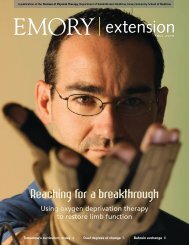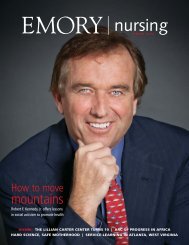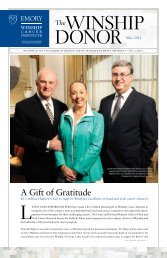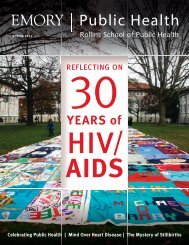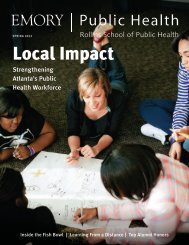returning quality to life - Woodruff Health Sciences Center - Emory ...
returning quality to life - Woodruff Health Sciences Center - Emory ...
returning quality to life - Woodruff Health Sciences Center - Emory ...
Create successful ePaper yourself
Turn your PDF publications into a flip-book with our unique Google optimized e-Paper software.
FEATURE COMFORT AT CRITICAL TIMES<br />
In American medicine, doc<strong>to</strong>rs have<br />
compiled reams of data and effectiveness<br />
studies on the therapy options that might<br />
help her answer the clinicians’ set of questions.<br />
But on the questions that matter most<br />
<strong>to</strong> her, American medicine can, at times, be<br />
woefully inadequate.<br />
Thankfully, that appears <strong>to</strong> be changing.<br />
Medical science is re-examining the<br />
important role that palliative care—pain<br />
management, emotional support, and other<br />
services not aimed at the underlying disease—can<br />
play in the practice of clinical<br />
medicine. Palliative care consults are becoming<br />
more routine for patients with advanced<br />
forms of disease where survival is often<br />
measured in months instead of years. And<br />
increasingly, patients and physicians alike<br />
are turning <strong>to</strong> palliative medicine as a vital<br />
part of an overall treatment plan <strong>to</strong> combat<br />
chronic, debilitating diseases that may not be<br />
immediately <strong>life</strong> threatening.<br />
Care that belies the<br />
“death panel” image<br />
The combination of aggressive therapy<br />
and palliative care intuitively makes sense.<br />
<strong>Emory</strong>’s palliative care direc<strong>to</strong>r<br />
Tammie Quest leads multidisciplinary<br />
teams that provide physical<br />
and emotional support for<br />
patients.<br />
4 EMORY HEALTH<br />
Patients who feel better, do better.<br />
But for years—because many associated<br />
palliative care with “giving up” in the fight <strong>to</strong><br />
beat cancer, heart disease, Alzheimer’s, and<br />
other killers—the common perception was<br />
that trying <strong>to</strong> control the patient’s pain and<br />
providing emotional support amounted <strong>to</strong><br />
the first step <strong>to</strong>ward hospice care. Discussion<br />
of these <strong>to</strong>pics with some patients was<br />
deemed premature at best and inappropriate<br />
at worst. Even last year when physicians,<br />
economists, and ethicists raised these <strong>to</strong>pics<br />
in the context of public policy—by suggesting<br />
during the health reform debate that<br />
Medicare routinely should pay for palliative<br />
care consults—some politicians rebuked<br />
them for favoring “death panels” for the<br />
elderly.<br />
The reality is much different.<br />
When <strong>Emory</strong> palliative care physician<br />
Sigy Jacob, who leads a palliative care team at<br />
<strong>Emory</strong> University Hospital (EUH) Mid<strong>to</strong>wn,<br />
met the young breast cancer patient, one of<br />
the first clinical steps she prescribed was simple—reconnecting<br />
the patient <strong>to</strong> her family.<br />
“Her family is local, but she is hesitant <strong>to</strong><br />
have them involved with her care,” she says.<br />
<strong>Emory</strong> Mid<strong>to</strong>wn physician Sigy<br />
Jacob says that palliative care<br />
is as much about taking care of<br />
families as patients.<br />
“Patients and families struggle when loved<br />
ones are diagnosed with a <strong>life</strong>-threatening illness.<br />
We help them understand that they are<br />
not alone, aid them in managing symp<strong>to</strong>ms,<br />
and assisting with psychosocial and spiritual<br />
challenges.”<br />
Similarly, in the same week that Jacob<br />
was meeting the breast cancer patient, her<br />
interdisciplinary team was working with an<br />
82-year-old heart failure patient <strong>to</strong> make sure<br />
the patient’s elderly sister was confident she<br />
could care for her at home. Palliative care<br />
often is about taking care of families as well<br />
as patients. “We meet patients where they are<br />
and walk the journey with them. That can<br />
include discussions about options for end-of<strong>life</strong><br />
care, if appropriate,” Jacob says.<br />
EUH Mid<strong>to</strong>wn, <strong>Emory</strong> University<br />
Hospital, Grady Memorial Hospital, and the<br />
Atlanta V.A. Medical <strong>Center</strong>—all staffed by<br />
<strong>Emory</strong> physicians—are among a minority of<br />
hospitals nationwide that offer certified palliative<br />
care services. Additionally, <strong>Emory</strong>’s<br />
medical school was recently approved by the<br />
Accreditation Council for Graduate Medical<br />
Education <strong>to</strong> sponsor a one-year fellowship<br />
for residents in hospice and palliative medi-<br />
Patient Dan Herbermann and wife Danya have turned <strong>to</strong> the palliative<br />
care team for help in managing the pain associated with Dan’s headand-neck<br />
cancer treatments. Here they meet with <strong>Emory</strong> oncologist<br />
Fadlo Khuri at the Winship Cancer Institute.









